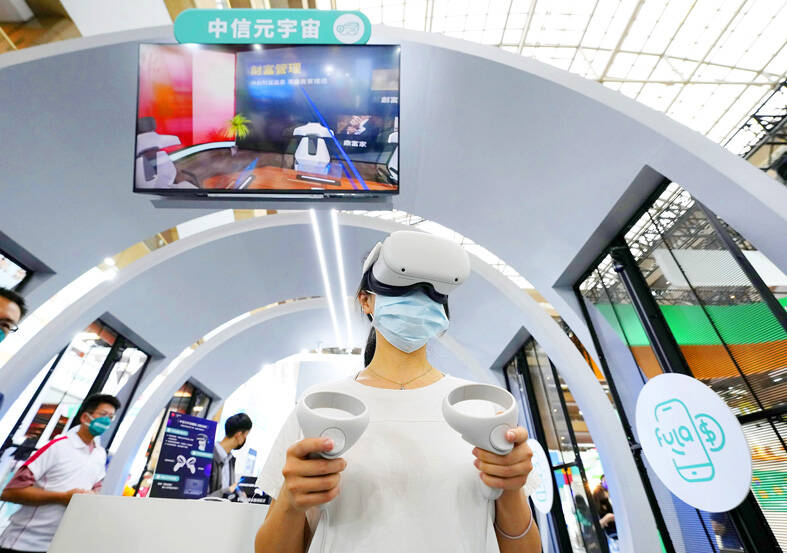The combined pretax profit of the nation’s financial companies plunged 32 percent annually to NT$558.5 billion (US$18.21 billion) in the first 10 months of this year, as global market routs hit insurance companies and securities brokerages, Financial Supervisory Commission data showed yesterday.
Life insurance companies reported a combined pretax profit of NT$291.4 billion through October, down 22.4 percent from a year earlier, as net investment gains contracted 5.5 percent, commission data showed.
Non-life insurers posted a combined loss of NT$133.8 billion in the first 10 months due to COVID-19 insurance policy claims of NT$11.3 billion, compared with a pretax profit of NT$21.4 billion in the same period last year, the data showed.

Photo courtesy of CTBC Financial Holding Co via CNA
Insurers registered a combined pretax profit of NT$157.6 billion, down 60 percent annually, the data showed.
Local securities companies’ pretax profit reported an annual retreat of 55 percent in combined pretax profit to NT$53 billion on falling fee revenue, the commission said.
The banking sector is the sole sector in the black, as banks’ combined profit grew 11 percent to NT$347 billion thanks to the central bank’s rate hikes and a growth in loans, Banking Bureau Deputy Director Phil Tong (童政彰) said.
Banks’ net interest income expanded 16.8 percent from a year earlier to NT$500 billion, despite single-digit percentage decreases in fee income and investment gains, Tong said.
While Taiwan’s financial companies registered a record pretax profit of NT$936.6 billion last year, they are expected to post an annual decline in profit this year in light of a high comparison base, along with insurance losses and volatile global markets, the commission said.
Several financial holding companies earlier said that they are planning to use their retained earnings to next year distribute cash dividends in spite of sluggish earnings growth this year.
The companies said their payout plans are still subject to the commission’s approval.
In principle, the commission would only allow companies with solid capital adequacy to distribute cash dividends next year, FSC Chairman Thomas Huang (黃天牧) told a meeting of the legislature’s Finance Committee.
How the companies would distribute their cash dividends and what sources they would use for the payouts are other factors, he said.

UNCERTAINTY: Innolux activated a stringent supply chain management mechanism, as it did during the COVID-19 pandemic, to ensure optimal inventory levels for customers Flat-panel display makers AUO Corp (友達) and Innolux Corp (群創) yesterday said that about 12 to 20 percent of their display business is at risk of potential US tariffs and that they would relocate production or shipment destinations to mitigate the levies’ effects. US tariffs would have a direct impact of US$200 million on AUO’s revenue, company chairman Paul Peng (彭雙浪) told reporters on the sidelines of the Touch Taiwan trade show in Taipei yesterday. That would make up about 12 percent of the company’s overall revenue. To cope with the tariff uncertainty, AUO plans to allocate its production to manufacturing facilities in

Taiwan will prioritize the development of silicon photonics by taking advantage of its strength in the semiconductor industry to build another shield to protect the local economy, National Development Council (NDC) Minister Paul Liu (劉鏡清) said yesterday. Speaking at a meeting of the legislature’s Economics Committee, Liu said Taiwan already has the artificial intelligence (AI) industry as a shield, after the semiconductor industry, to safeguard the country, and is looking at new unique fields to build more economic shields. While Taiwan will further strengthen its existing shields, over the longer term, the country is determined to focus on such potential segments as

TAKING STOCK: A Taiwanese cookware firm in Vietnam urged customers to assess inventory or place orders early so shipments can reach the US while tariffs are paused Taiwanese businesses in Vietnam are exploring alternatives after the White House imposed a 46 percent import duty on Vietnamese goods, following US President Donald Trump’s announcement of “reciprocal” tariffs on the US’ trading partners. Lo Shih-liang (羅世良), chairman of Brico Industry Co (裕茂工業), a Taiwanese company that manufactures cast iron cookware and stove components in Vietnam, said that more than 40 percent of his business was tied to the US market, describing the constant US policy shifts as an emotional roller coaster. “I work during the day and stay up all night watching the news. I’ve been following US news until 3am

COLLABORATION: Given Taiwan’s key position in global supply chains, the US firm is discussing strategies with local partners and clients to deal with global uncertainties Advanced Micro Devices Inc (AMD) yesterday said it is meeting with local ecosystem partners, including Taiwan Semiconductor Manufacturing Co (TSMC, 台積電), to discuss strategies, including long-term manufacturing, to navigate uncertainties such as US tariffs, as Taiwan occupies an important position in global supply chains. AMD chief executive officer Lisa Su (蘇姿丰) told reporters that Taiwan is an important part of the chip designer’s ecosystem and she is discussing with partners and customers in Taiwan to forge strong collaborations on different areas during this critical period. AMD has just become the first artificial-intelligence (AI) server chip customer of TSMC to utilize its advanced